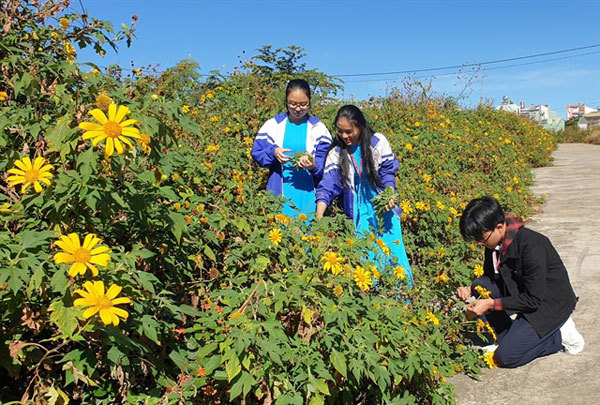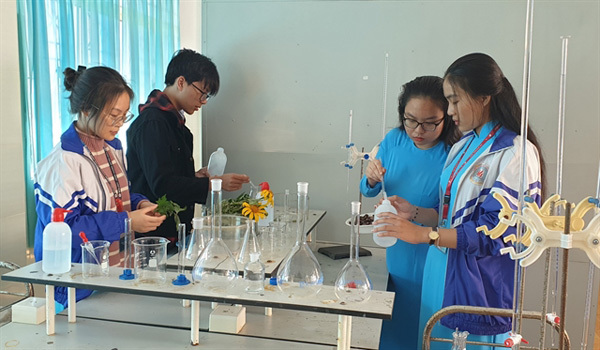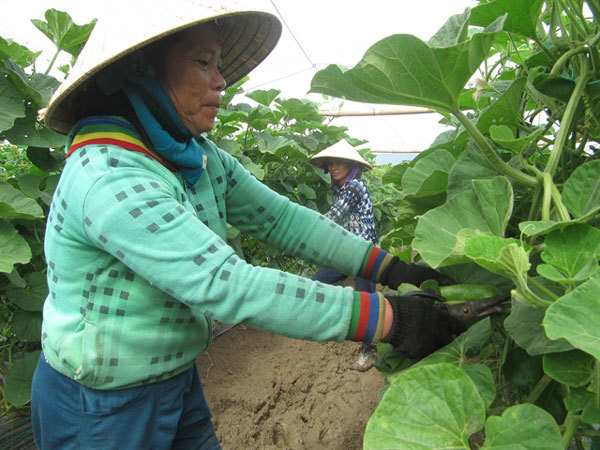 |
| IN THE FIELD: Students researching wild sunflowers as part of their project. VNA/VNS Photos Hong Diep |
From the Hung Vuong High School in the Central Highlands province of Gia Lai, the students have completed a project on producing biological insecticide and organic fertiliser, called Combo (Far-Sup), from cashew nut shells and wild sunflower leaves.
The project overcame 753 other candidates to win second prize at the 2020 National Creative Contest for youth and teenagers.
Its environmentally-friendly products originated from the idea of building a closed process and utilising agricultural waste from cashew production.
The project is being conducted by a group of students in Grades 11 and 12 -- Le Nhat Minh, Tran Le Hai, Phan Le Khanh Duong, Huynh Thi Thanh Huyen, and Vo Trong Nhan -- under the guidance of teachers led by Dr Phung Thi Kim Hue, a biologist.
According to group leader Minh, the project was inspired by the passion of the team to dig deeper into the issue and the dedicated guidance of their teachers.
“Our success in the invention and production of Combo (Far-Sup) comes from the sense of environmental protection we gained through lessons at school and the life skills we learned through our extracurricular activities,” Minh said. “It is also proof of our success in applying knowledge in life.”
 |
| BACK AT THE LAB: The students conduct experiments in the laboratory at Hung Vuong High School. |
Their research revealed that, every year, about 50,000 tonnes of cashew shells are released after harvest into the environment in Gia Lai.
The huge volume has polluted water and air in the local area because it contains a range of harmful substances.
“Our research showed that the shells contain certain substances that can inhibit insect activity,” Minh explained.
“What can be extracted from the shell, when combined with extracts from the wild sunflower leaves, creates a mixture that is effective in fighting the green-nosed stink bugs that are harmful to the cashew trees. The remaining residue from the shells can be composted, to produce bio-organic fertiliser.”
The students were able to build a closed material cycle in cashew production, taking advantage of what plants create but humans do not use to “serve” the former.
Combo (Far-Sup) probiotic products will help farmers replace or at least limit to a minimum the use of chemical pesticides while at the same time boosting the use of organic fertiliser on fields.
To implement the project successfully, the students visited local areas with the most cashew trees, including Ia O Commune in Ia Grai District, to conduct surveys and experiments. They had to manage their time effectively in order to strike the right balance between study at school and research out in the fields.
After more than a year of tinkering, exploring, and experimenting, the project made a breakthrough.
Group member Hai said the most difficult task in the project was determining how to extract the substances contained within the cashew nut shell.
As shells also contain allergens, the team took months working out how best to remove the harmful substance.
Biologist Hue said the Combo (Far-Sup) preparations extracted from plant waste is sure to help protect and boost the growth of cashew trees.
“The products the group has made are not yet found anywhere else,” the teacher said.
“They are extremely practical, as they not only make use of the waste bark from the cashew trees but also exploit local wild plants as raw materials. The price is therefore affordable for farmers and gives them the opportunity to use safe organic products and develop sustainable industrial crops.”
Gia Lai has more than 176,000 ha of perennial industrial crops, of which the cashew area totals nearly 18,000 ha.
After harvesting, farmers use only the kernel to produce cashew products such as dried and roasted nuts, while the discarded shells have long blighted the local environment.
Meanwhile, large areas of wild sunflower trees, which were previously only known for their beauty when in bloom, can now serve a greater purpose, as their leaves are used to create bio-products for farming.
The model the students used combining agricultural waste and wild plants to create useful bio-products that contribute to environmental protection needs to be promoted and applied widely in other parts of the country. VNS
Hong Diep

Rising pollution prompts VN Environment Administration to issue warning
The Vietnam Environment Administration has advised members of the public, especially children, the elderly, pregnant women and those with respiratory diseases, to limit outdoor activities due to rising pollution.

Organic farms fuel sustainable development
Born in Dien Ban Town, Quang Nam Province, 37-year-old Duong Hien Tu has developed the area's first organic ecological agriculture system and a sustainable farming model over the past seven years to create the An Phu organic farm brand.